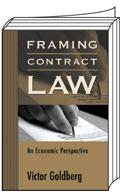Professor Goldberg's Book Examined at Conference on Contracts
Framing Contract Law (Harvard University Press, 2007), by Victor Goldberg, Jerome Greene Professor of Transactional Studies; Co-director, Center for Law and Economic Studies, was the subject of the opening session of the Third International Conference on Contracts.
Professor Franklin Snyder of Texas Wesleyan University School of Law, a conference organizer, chose the book because its subject matter “cuts across every aspect of contract law.”
University of Chicago Law School Professor Douglas Baird, who focuses on corporate reorganizations and contracts, said Framing Contract Law “ought to be read by everyone who teaches contract law in an American law school. Even more important, it ought to be read by every lawyer who writes or negotiates contracts.”
In the book, Prof. Goldberg, the Jerome Greene Professor of Transactional Studies and co-director of Columbia Law School’s Center for Law and Economic Studies, argues that an economic framework is appropriate for analyzing disputes and developing doctrine around contracts. He illustrates how major contract cases might have resulted differently if the courts and litigators had understood the economic contexts of their underlying transactions.
The conference panel “Transactional Economics: Victor Goldberg’s Framing Contract Law” featured commentary by three law professors and response by Prof. Goldberg. One point debated among participants was whether courts should interpret or construe contracts to protect parties when a literal application would yield an unfair result. Prof. Goldberg argued that courts should be cautious about using doctrinal devices, such as the penalty clause doctrine or the implied covenant of good faith, to trump the contract structures designed by serious commercial parties.The Third International Conference on Contracts, held in February at South Texas College of Law in Houston, drew approximately 40 contract law scholars from universities around the United States and other countries.

